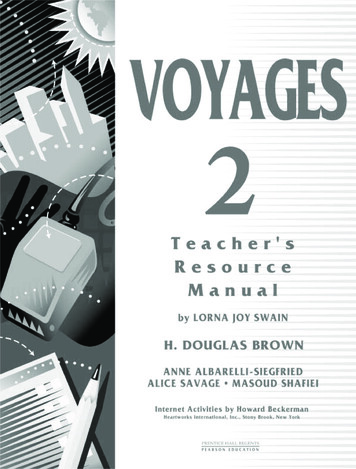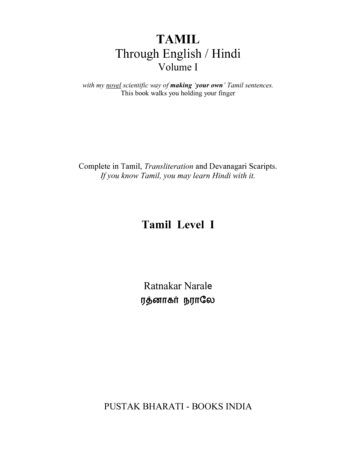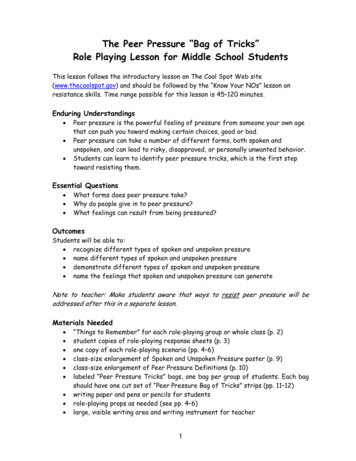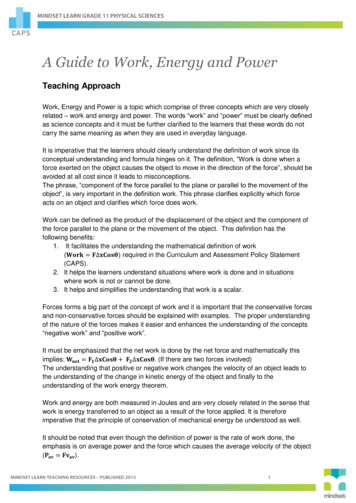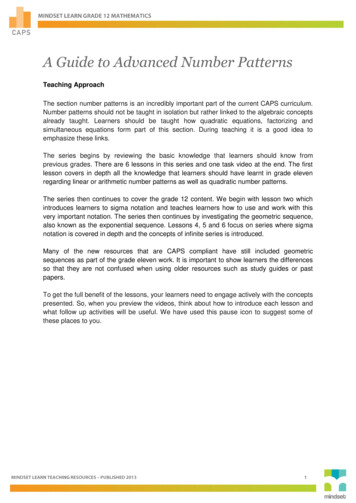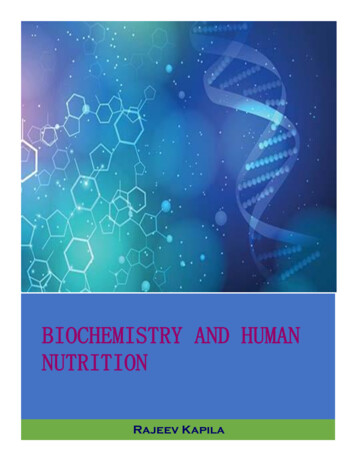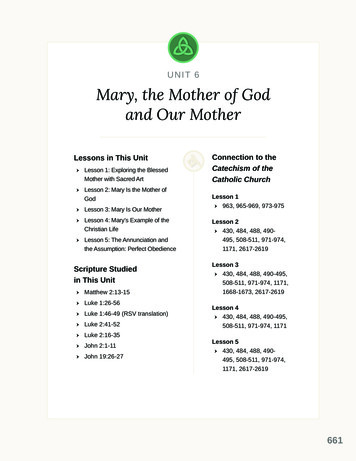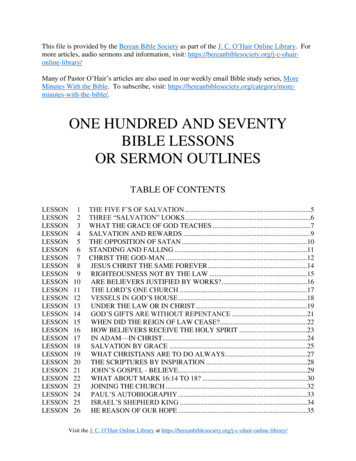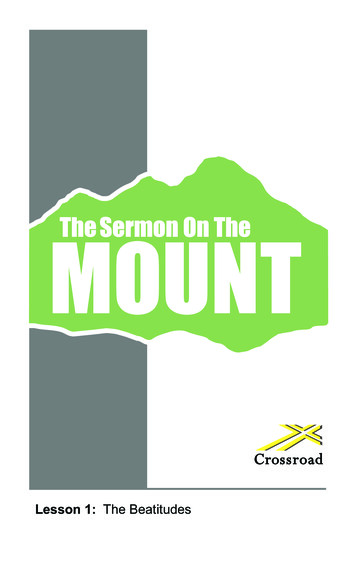
Transcription
Lesson 1: The Beatitudes
Notes, Prayer Requests and CommentsCopyright 1997, 2007, 2016 by CBI Publishing CenterAll Scripture quotations, unless otherwise indicated, are taken from the Holy Bible, New International Version , NIV .Copyright 1973, 1978, 1984, 2011 by Biblica, Inc. Used by permission of Zondervan. All rights reserved worldwide.www.zondervan.com The “NIV” and “New International Version” are trademarks registered in the United States Patentand Trademark Office by Biblica, Inc. v.0716
LESSON 1. The BeatitudesThe Introduction and Setting of the SermonCrowds. Miracles. Teaching. As you read through the Gospels, you will find thatthese three words describe a large part of Jesus’ ministry.(Optional) Verses for IN-DEPTH study: Matthew 4:23-25, 7:28-29, 8:1-4,19:2; Mark 1:21-28, 4:2; Luke 4:38-44, 9:37-45; and John 9:1-12, 11:38-57.In our text (Matthew 5-7), Jesus sits on a hillside by the Sea of Galilee and teaches. The “sermon” taught there, known as The Sermon on the Mount, representsthe main themes of Jesus’ preaching during His ministry. Essentially, it is adescription of life in the Kingdom of God.The Sermon on the Mount has been called the “Constitution of the Kingdom ofGod.” This is because the sermon teaches us the characteristics of citizens of theKingdom of God and the basic principles by which the Kingdom is governed. Byviewing Jesus’ sermon this way, an outline of its contents becomes clear:I.II.Matthew 5:1-16 describes the characteristics of citizens of the Kingdomof God.Matthew 5:17 to 7:29 addresses the life and conduct of citizens of theKingdom of God.Even though there was a large crowd present to hear Him, Jesus’ sermon wasdirected toward the disciples, and through them, to the whole Church, including us.Let’s learn from this sermon how God would have us live in His Kingdom.INTRODUCTION TO THE BEATITUDESREADING: Before you continue, please read through The Beatitudes found inMatthew 5:1-12.In the Old Testament, God formed the nation of Israel, calling them into a relationshipwith Himself (see Exodus 20 and 24; Deuteronomy 5 and 6, and 7:6). As King, Godestablished a formal agreement with the citizens of His Kingdom called a covenant.Prophets of God were called to pronounce God’s blessing on the people when theyobeyed the covenant or His curses when they disobeyed the covenant. The declarations of blessing were called oracles of weal. The declarations of curses werecalled oracles of woe. Matthew 5:3-13 is called The Beatitudes, which means the“blesseds,” because they are oracles of blessing (weal) from Jesus Christ, the GreatProphet. If we want to be faithful citizens of God’s Kingdom we must understandwhat Jesus teaches in The Beatitudes and implement His teaching in our lives.Some say the word “blessed” simply means happy. But it means much more.Blessedness is the deep, abiding joy that comes when we live in harmony with Godand the principles of His Kingdom.The Sermon on the Mount–Lesson 1v.07161.
There are some important things to note about The Beatitudes. First of all, TheBeatitudes show us the character of the true Christian, a citizen in God’s Kingdom,a character that can only be produced through the power and grace of God.Secondly, The Beatitudes bring us to Christ, because from them, we notice ourfailure to live how God calls us to, and therefore recognize our need for Christ’srighteousness to be credited to us. The Beatitudes are also written in an order thatdescribes the process of growth in the Kingdom of God by which we can examineour own spiritual growth and health. As we study The Beatitudes, let us examineourselves before God.1. Before you continue, pray and ask God to show you what it means to be acitizen in the Kingdom of God as you study The Beatitudes. Check here when you’re done.2.The word “blessed” means to have the deep, abiding joy that comes whenwe live inHis Kingdom.with God and the3.The Psalms begin with an oracle of weal and an oracle of woe. ReadPsalm 1.a. What does a blessed person delight in?b. What will be the future of the wicked?THE FIRST BEATITUDEofPoor in SpiritMatthew 5:3The first of eight beatitudes describes the beginning point of growth as a citizen ofthe Kingdom. It is being “poor in spirit.” This phrase can be understood by thinkingof actual poverty, the state of being poor, as it is described in the Bible. In theBible, the poor are those who have to utterly depend on others because they lackthe personal resources or abilities to live in a state of wellbeing. Likewise,Christians who are “poor in spirit” have recognized that they are totally dependenton God for their own wellbeing. They have recognized the sin and corruption oftheir hearts, and know that they do not have the resources or abilities to pleaseGod on their own. They know that they need the help of the King—Jesus Christ.Christians who are poor in spirit are humble. They live in humility when they areliving in complete dependence on God—His mercy and His grace. TheseChristians must rid themselves of their selfishness, pride, and self-reliance.Poorness in spirit is realized in our lives as we stand in the awesome presence ofour holy and just King. We see that as we stand before God’s majesty we arenothing and depend totally upon Him.2.The Sermon on the Mount–Lesson 1
Being poor in spirit is the first step in Christian growth because no one will enterthe Kingdom of God without poverty in spirit. Notice that this first step opens theKingdom of Heaven to the Christian. In our world, the rich, powerful, and famoushave kingdoms. In God’s Kingdom, however, it is the poor in spirit, those whoutterly depend on God, who gain the Kingdom of Heaven.4.Fill in the blanks from your reading.Christians who are “poor in spirit” have recognized that they areon God for theirown wellbeing. They have recognized theof their hearts, and know that they do not have the resources or abilities toplease God. They know they need the5.Read 1 Peter 5:5-7 and answer the following questions.a. With what are we to be clothed?b. “Godandof the King.the proud, but showsto the humble”(1 Peter 5:5).6.Read Isaiah 6:1-5. Here Isaiah is driven to see that he is poor in spirit.What caused this?7.Read Philippians 2:3-5 and fill in the blanks below.Do nothing out of selfishinor vainvalue others above yourselves, not looking to yourown interests, but each of you to the interests of theyour relationships with one another, have the same mindset as. Rather,. In.(Optional) Verses for IN-DEPTH study: Job 5:11; Proverbs 3:34, 11:2; Ecclesiastes5:1-3; Isaiah 57:15, 66:2; Matthew 20:26; Luke 6:20, 14:10; John 13:14; Romans12:3, 12:16; Philippians 2:3; Colossians 3:12; and James 1:9, 4:10.THE SECOND BEATITUDEMourning Over SinMatthew 5:4How can this be: Blessedness from mourning? Yet, that is exactly what this beatitude declares. The “mourning” in this beatitude refers to the mourning that occurswhen we stand in poverty of spirit before a holy God. Citizens of the Kingdom ofThe Sermon on the Mount–Lesson 13.
God constantly recognize their unholiness and sin before their Holy King, andsorrowfully mourn over it. They cry out to the Holy One for grace, mercy, andfreedom from sin and its consequences. Not only do citizens of the Kingdom ofGod mourn over their own sins, but they mourn for all the sin around them. Theyrecognize that all sin and unholiness is a stench in God’s nostrils.Notice Jesus’ promise to those who mourn because of their sin and unholiness—“they will be comforted.” When Christians face the terror that comes from recognizing their sin before a holy God, they are filled with joy and blessedness as theGospel declares their deliverance from this sin and reconciliation to God in: the past as Christ forgives them for sins committed. the present as they are delivered from the daily power and effects of sin. the future as they recognize that their sin will be removed forever when Christredeems His people on the Last Day.The Christian knows that there will not be complete comfort from mourning in thislife. There will still be suffering and affliction, and we still struggle with sin (Romans7). But for the Christian, there is true and complete comfort in heaven andbecause of this, we can rejoice (Psalm 30:4-5, 126:5-6) and not lose heart (2Corinthians 4:16-18).8.How does God respond to our sin according to Romans 1:18?9.Read Psalm 5:4-6 and fill in the blanks below.“For you are not a God who iswith; with you,people are not welcome. The arrogant cannotin your presence. Youthose who tell lies. The bloodthirsty and deceitful you, Lord,all who do wrong; you.”10. According to what we learned in this beatitude, what does the Christianmourn over?11. Read 2 Chronicles 7:14.a. If we want God to hear us when we talk to Him, what must we do?b. If we do this, what will God do?12. Read Isaiah 6:1-8. God met Isaiah in a powerful way. What was Isaiah’sresponse to God’s majestic holiness?4.The Sermon on the Mount–Lesson 1
THE THIRD BEATITUDEMeekness Is Not WeaknessMatthew 5:5The Beatitudes move in an order that describes the process of spiritual growth bywhich we can evaluate our spiritual condition as citizens in God’s Kingdom. WhenChristians begin with poverty in spirit, they start to mourn over their sin and the sinof the world as it is lived out before the face of a holy God. This then leads tomeekness. Meekness is the quality of having a submissive, gentle, and patientattitude even though we may have great strength and power.Meek people are not weak people. The word for meekness in this verse finds itsbackground in the training of horses. A horse is a very powerful animal, able to killsomeone with a simple kick of a hoof. The goal in training a horse, however, is notto remove the power of the horse, but to bring its power under the control of itsmaster. The goal of the trainer is to get the horse to submit to its master and followtheir lead. The same can be said of a Christian. God has created us with greatpower and abilities in both mind and body. These are to be submitted to ourMaster. When we have submitted to God we are then called meek. A meek personis a person harnessed under God’s control.People who submit their lives to God will “inherit the earth.” This does not meanthat we will just inherit a piece of property. Rather, it means that we will receivefrom God blessing and security as we live in His presence.In one sense, the meek already inherit the earth in this life because we alreadyexperience the presence and blessing of God in a limited way right now. In heaven, however, we will experience the full security that comes by living totally inGod’s presence without the influence of sin and evil around us.13. How does the definition of biblical meekness described above differ fromthe idea that meekness is weakness?14. Read Philippians 2:6-11, Hebrews 2:9-18, and 1 Peter 2:21-25 and reviewthe crucifixion story in Matthew 27:27-55. Make a list of some of the waysChrist demonstrated meekness.(Optional) Verses for IN-DEPTH study: Job 22:21; Psalm 37:11; 2 Corinthians10:1; Galatians 5:23; Ephesians 4:2; Philippians 4:5; Colossians 3:12; Titus3:2; and James 3:17, 4:7.The Sermon on the Mount–Lesson 15.
THE FOURTH BEATITUDEHungering for RighteousnessMatthew 5:6The beatitude “Blessed are those who hunger and thirst for righteousness, for theywill be filled” refers to the desire to be free from all sin in all forms; it involves asincere desire to be holy. Righteousness is being right with God.We remember that blessedness is the deep, abiding joy that comes when we livein harmony with God and the rules of His Kingdom. This beatitude teaches us thatwe must hunger and thirst to live right with God. We must hunger and thirst to liveour lives according to His commands. Hunger and thirst are deep passions andcravings that go on until satisfied. It becomes desperate and agonizing. Thepsalmist’s hunger in Psalm 42 is what Jesus is talking about here.If we truly hunger and thirst for righteousness, we will be satisfied by ChristHimself, because He alone is our righteousness. Satisfaction in Christ happensimmediately for those who believe, but just like you continually crave food anddrink, there is also an ongoing process because the removal of sin, which is doneby the Holy Spirit, is a lifelong process. The perfect fulfillment of this beatitude’spromise comes in heaven, when all Christians will be gathered at the throne ofGod, standing blameless and perfect before Him and experiencing the true fulfillment and satisfaction of their souls' deepest longings.15. Read Matthew 6:31-33.a. What must a Christian seek first?b. What will then be added to us?16. Fill in the blanks below based on your reading.“Blessed are those who hunger and thirst for righteousness, for they willbe filled” refers to theto be free fromin all forms; it involves a sincere desire to be.17. Memorize Psalm 42:1-2. Check here when you’re done.(Optional) Verses for IN-DEPTH study: Psalm 1, Psalm 17:15, Psalm 37; Isaiah26:9; Hosea 14:9; Habakkuk 2:4; Romans 5:19; Ephesians 4:24; 1 Timothy 6:1;and 2 Timothy 2:22.6.The Sermon on the Mount–Lesson 1
THE FIFTH BEATITUDECompassion in ActionMatthew 5:7This beatitude declares that we are blessed when we are merciful. Mercy is compassion that causes one to help a poor, sick, or needy person. Mercy is compassion in action! Mercy is also a sense of pity with a desire to relieve the sufferingthat causes misery.God has shown great mercy toward us. God’s mercy and love were seen mostclearly in His Son’s death on the cross when we were saved. We weren’t savedbecause of any righteous things we did, but simply because of God’s mercy andkindness. God’s mercy should motivate the citizen of the Kingdom of God to showmercy to others, especially to those in need (Psalm 41:1). We do not show mercyin order to receive mercy in return, but we show mercy because we have beengiven mercy from God.18. Mercy is compassion in.19. Read Titus 3:3-6. Circl
Bible, the poor are those who have to utterly depend on others because they lack the personal resources or abilities to live in a state of wellbeing. Likewise, Christians who are “poor in spirit” have recognized that they are totally dependent on God for their own wellbeing. They have recognized the sin and corruption of their hearts, and know that they do not have the resources or .
